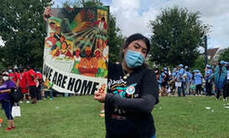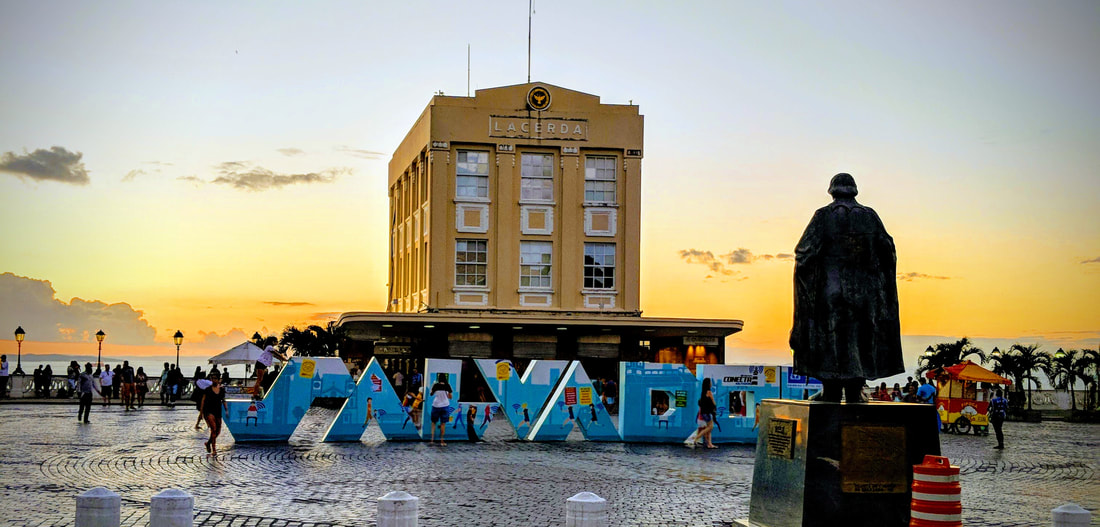|
By Betty Garcia Herrera What is Pantanal you ask? It’s a telenovela that my host family seems to have their eyes glued to! Just as wehad returned from our trip to Morro de São Paulo, I couldn’t help but observe that my host mother rushed to feed me a quick snack before the premier of the newest episode of Pantantal came on. Her mother, my host grandma, would repeatedly warn her that it would be starting any second as she tried her best to juggle her tasks – “Valeria!” “Valeria!” (my host mother’s name) shouted by her mother as she waited for her to return to the television. “Television has thus become the most significant shape of the image of Brazilian national identity, both internally and externally” (Stam 1995). The living room is quite a distance from the kitchen, and with that she tried her best to converse with me about how my trip was but I knew she wanted to go watch her telenovela so I cut our conversation short. It was quite adorable to have seen her try to make sure I was comfortable, but it made me wonder what this tv show was all about. Next day goes, and I asked my avo what the title of the show was named. She said "Pantanal", and after a quick google search, it is “a Brazilian telenovela produced and broadcast by TV Globo that premiered on 28 March 2022" (Wiki 2022). As I read it was from TV Globo, I was reminded of the covered material in our CD mod class. Our assigned book readings, "Globalizing Brazil" from Becoming Brazilian by Marshall C Eakin. Reading what was related to their programming of telenovelas, "Globo’s creative personnel effectively forged a genre that became quintessentially Brazilian and, at the same time, became one of the most important venues for the national conversation on Brazilian identity" (Straubhaar 2007). With the growing hold TV Globo had on the population of Brazil, I wondered if it was censored into certain topics, but as I read on in the chapter, “The lead writers of the novelas often sought to create a national conversation about critical societal issues – racism, gender roles, corruption, and social justice" (Eakin 2017). This was relieving and interesting to learn about. TV Globo could’ve quite easily become a network that targets the relatability of the elites/higher class, but instead perfected this sort of shift in the production that categorizes telenovelas to be the main topic of inequality, race, and gender!! “Despite spirited debates about the content of novelas, their portrayal of race, and their impact on Brazilians, critics generally agree that they have provided the most important forum for the conversation about national identity since the 1960s” (Eakin, 2017). I decided to tune in, and watch one of the episodes of Pantanal. I didn’t quite understand what was going on, but knew something tragic was going to occur as the suspenseful music would increase through the screen. It did seem quite interesting, and be drawn towards the likability of the male characters as they would have some tension between the male character and a female character. It’s honestly something I would watch voluntarily, but to see the emotions my host family would experience as their favorite character would lead towards trouble was truly unforgettable. TV Globo telenovelas have significantly impacted Brazil, and those who are loyal viewers, like my host mother, view programs that provide the subject of these inequalities with passion and emotion. "Each, in its own way, provided virtually all Brazilians with a vision of Brazil and its place in the world" (Eakin 2017). Works Cited Eakin, M. (2017). “Globo-lizing” Brazil: Televising Identity. In Becoming Brazilians: Race and National Identity in Twentieth-Century Brazil (New Approaches to the Americas, pp. 136-164). Cambridge: Cambridge University Press. doi:10.1017/9781316800058.006 Joseph D. Straubhaar, World Television: From Global to Local (Los Angeles: Sage Publications, 2007), 152-57. Robert Stam, João Luiz Vieira, and Ismael Xavier, “The Shape of Brazilian Cinema in the Postmodern Age,” in Brazilian Cinema, eds., Randal Johnson and Robert Stam, Expanded Edition (New York: Columbia University Press, 1995), 391. Wikimedia Foundation. (2022, May 23). Pantanal (2022 TV series). Wikipedia. Retrieved May 25, 2022, from https://en.wikipedia.org/wiki/Pantanal_(2022 TV Series)  Betty Garcia Herrera is an upcoming sophomore at College of Saint Benedict. She's currently majoring in environmental studies on a pre-engineering track. Her hometown is Worthington, Minnesota. Betty loves being apart of the conversation on social justice issues. During her time in Brazil, she hopes to analyzed more deeply how race and gender are important categories in understanding the country’s struggle for social and economic development.
0 Comments
Leave a Reply. |
Archives
June 2024
Categories
All
|

 RSS Feed
RSS Feed
